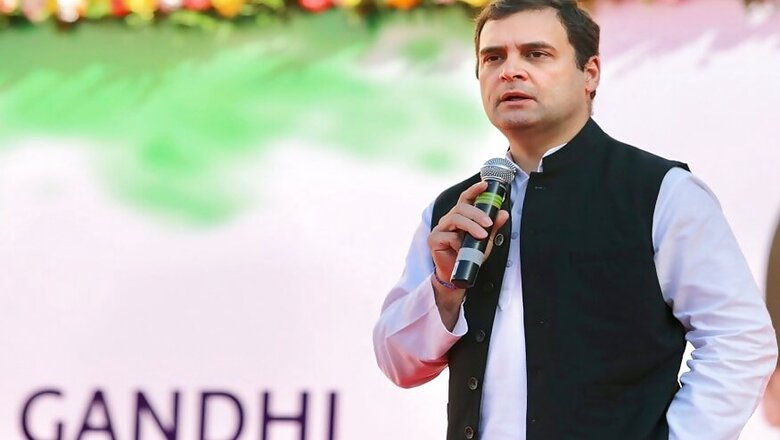
views
Congress president Rahul Gandhi has been as good as his word on Niti Aayog. Days after tweeting that if successful in the forthcoming Lok Sabha elections his party would end the Niti Aayog, its manifesto has echoed the same thought: “Congress will scrap the Niti Aayog, which has proved to be a noisy and incompetent intermeddler. Congress promises to constitute a Planning Commission.” It may be recalled that Prime Minister Narendra Modi had done away with the Planning Commission, replacing it with Niti Aayog.
But what the two grandees, and their cronies, don’t realise is that when institutions are killed with the installation of new governments, a democracy loses robustness and resilience.
For institutions and conventions are the warp and woof of democracy. Without them, the constitution becomes a shell sans kernel, government an oligarchy, statecraft a game of snakes and ladders, and political morality merely a weapon to thrash rivals with. Unfortunately, we are almost there. And, typically, all parties share the blame.
The sad story began with Indira Gandhi who sought to dominate or, if that was not possible, subvert all institutions, be it the judiciary or academics. Concomitantly, democratic conventions also took a backseat. The consequences have invariably been deplorable and deleterious for democracy.
Perhaps the first major breach of convention was by former president K.R. Narayanan (1997-2002). Before him, a healthy, transparent convention was set by two of his predecessors: R. Venkataraman and S.D. Sharma. In the general election in 1989, the Congress failed to get a majority but still emerged as the largest party. The incumbent president, Venkataraman, went mathematically: he first invited Congress leader Rajiv Gandhi, who refused the offer; then he invited V.P. Singh. On May 15, 1996, Venkataraman’s successor Sharma followed this precedent and asked Atal Bihari Vajpayee to constitute the government, which lasted for 13 days. A precedent was set, with the imprimatur of two successive heads of state.
What is more, it was also approved by the judiciary, in the famous Bommai judgment (1994) of the Supreme Court. The apex court said that only a floor test could determine whether a government enjoyed the support of the Lok Sabha or Vidhan Sabha.
The second time Vajpayee emerged as the leader of the largest party, and coalition, in 1998, the occupant of Rashtrapati Bhawan was Narayanan. He trashed the convention of inviting the leader of the biggest party, set aside the unambiguous apex court verdict in the Bommai case, and whimsically asked Vajpayee to submit letters of support for his claim. He practically reduced the majestic Rashtrapati Bhawan to a post office. He also attracted the charges of partisanship—not just from Bharatiya Janata Party leaders but also former prime minister Chandra Shekhar—thus demeaning the institution of the President of India.
The result? We now have mutually conflicting precedents to deal with situations arising out of hung Parliament or Assembly. Typically, politicians have the luxury of choosing the most suitable precedent. This further vitiates the processes of democracy.
Unfortunately, the incumbent President Ram Nath Kovind also believes in setting rather than following precedents—a proclivity that cost union minister Smriti Irani the Information & Broadcasting portfolio and blighted the 65th National Film Awards ceremony last year. As many as 56 out of the 140 awardees boycotted the event.
The reason was that Kovind had agreed to give awards to only 11 winners in various categories. This was against the convention. A Rashtrapati Bhawan press note said: “President attends all award functions and convocations for a maximum of one hour. This has been the protocol since he took office. It was conveyed to I&B Ministry several weeks ago and the Ministry knew this all along. Rashtrapati Bhawan is surprised by the 11th hour questions that have been raised.” Notice “since he took office.”
At that time, I had asked Ashok Malik, press secretary to the President of India, why Kovind breached the 67-year-old tradition. “Since he became President, he has been following this protocol (of attending any function for one hour),” Malik said.
But can and should an incumbent President’s protocol wreck a decades-old convention? Will every president have his own protocol? Malik refused to answer, saying he didn’t want to enter into a debate.
It is, however, not just some presidents who have shown scant regard for conventions and institutions; prime ministers have done the same too. We have mentioned Indira Gandhi but Modi has also breached an important tradition: Every year, he participates in the Dusshera festivities at New Delhi’s Ramlila Maidan, but in 2016, with an eye on the UP Assembly polls, he chose to do it in Lucknow.
In his masterly 1883 work, ‘Introduction to the Study of the Law of the Constitution’, A.V. Dicey, legendary constitutional theorist, wrote that constitutional law “consists of two elements. The one element, here called the ‘law of the constitution,’ is a body of undoubted law; the other element, here called the ‘conventions of the constitution,’ consists of maxims or practices which, though they regulate the ordinary conduct of the Crown, of Ministers, and of other persons under the constitution, are not in strictness laws at all.”
Dicey regretted that “these maxims must be called ‘conventional,’ for the word suggests a notion of insignificance or unreality. This, however, is the last idea which any teacher would wish to convey to his hearers. Of constitutional conventions or practices some are as important as any laws, though some may be trivial, as may also be the case with a genuine law.”
It is unfortunate that in India, whose democracy is modeled on Britain’s, the most important people are so cavalier about institutions as well as conventions. Partisanship, politics, pique, and even caprice can trash a convention and trump an institution. More than one of these seem to be rousing Rahul to rail against Niti Aayog.
(The author is editor of Power Corridors. Views expressed are personal.)




















Comments
0 comment